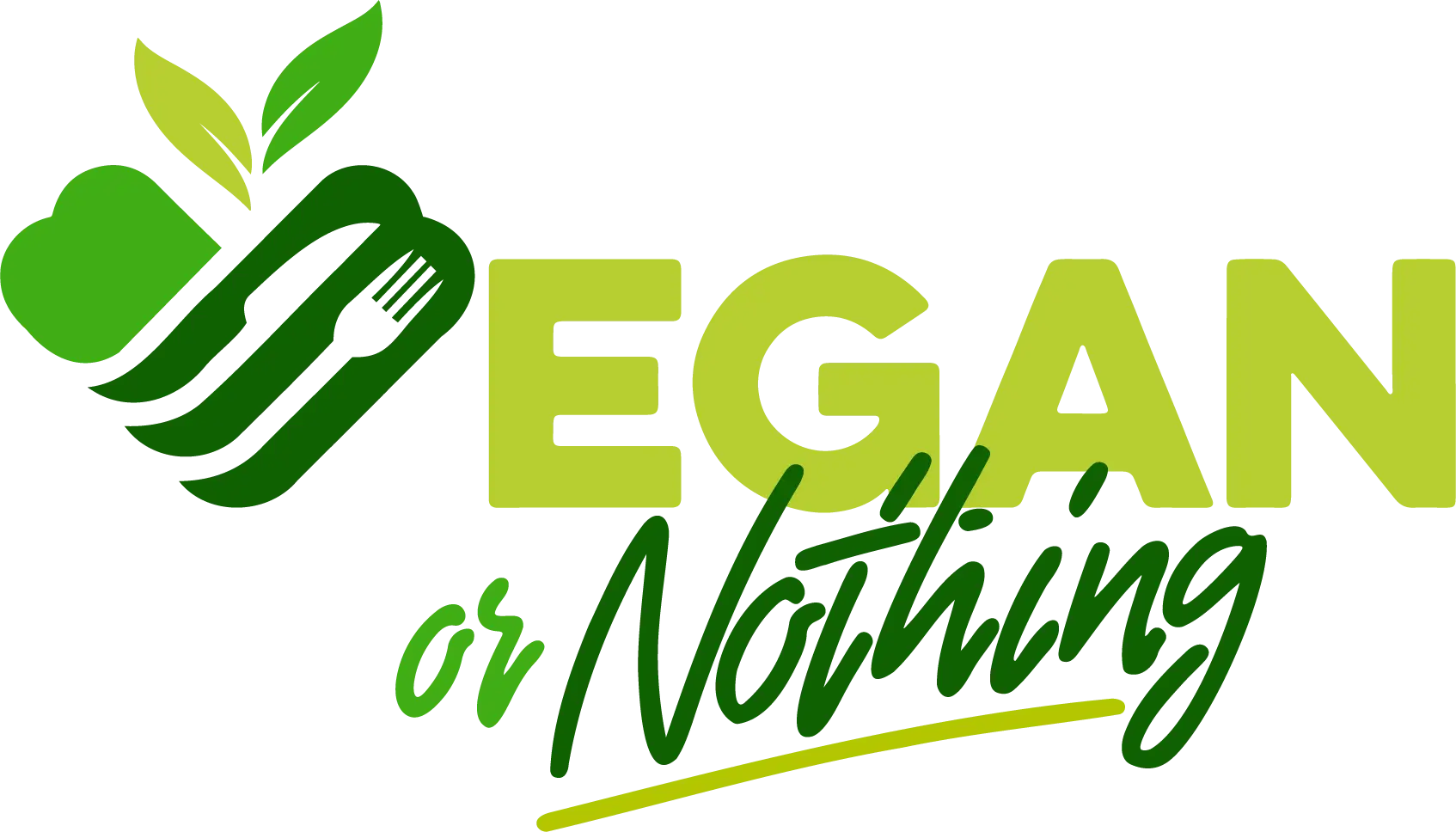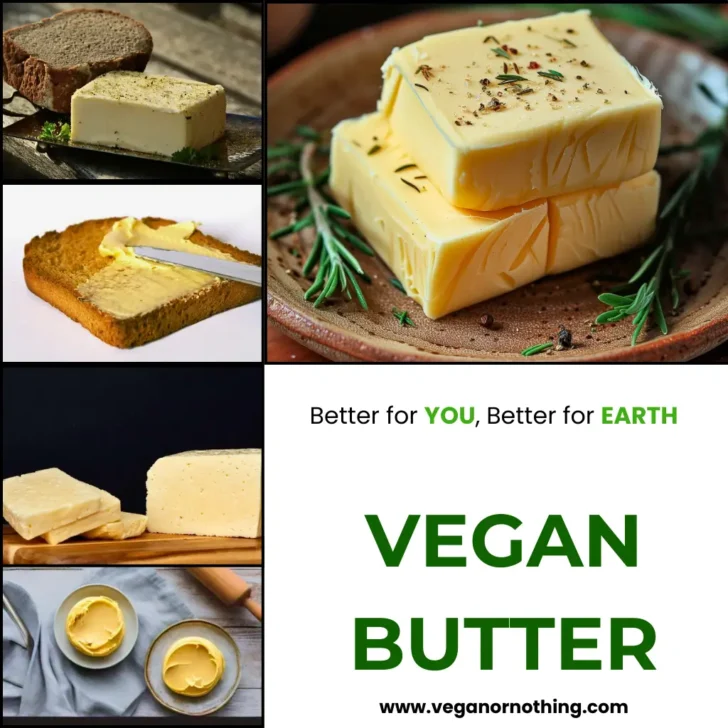Read time: 9 mins.
Table of Contents
Introduction:
Butter is a staple in many households, and it is made by separating the butterfat from the buttermilk. But traditional butter is off the menu if you’re embracing a vegan lifestyle. Don’t worry, though—vegan butter’s a delicious and healthy alternative.
When my family and I embarked on our vegan journey, the absence of butter was the first culinary challenge we faced. We missed its creamy texture on our toast, its rich flavor in our baking, and its versatility in our cooking.
Determined to find a solution, I began a series of culinary experiments with vegan butter recipes. The initial results were uncertain, but our commitment to our new lifestyle and our love for our favorite foods kept us going.
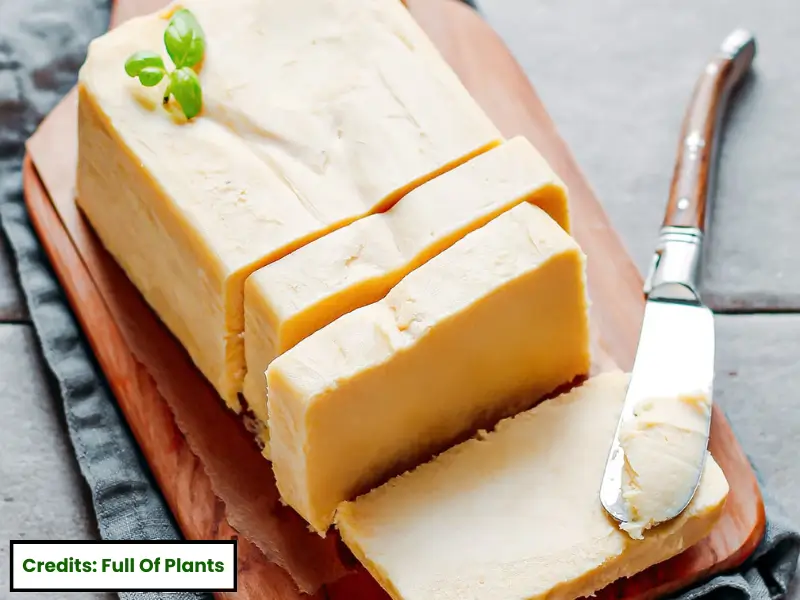
The process of creating vegan butter at home is surprisingly simple. With just a few basic ingredients like coconut oil, almond milk, and a pinch of salt, you can whip up a batch that rivals the taste of traditional butter. I remember my initial doubts when I first attempted it. But when I spread it on a warm slice of toast and took a bite, I was blown away. It was smooth, flavorful, and everything I could have hoped for.
Now, let’s learn more about this fantastic vegan alternative!
What Is Vegan Butter?
Vegan butter is a healthy alternative to regular butter, completely free of animal products. Made from vegetable oils and other natural ingredients, it’s perfect for those who follow a vegan diet, are lactose intolerant, or have other dietary restrictions. It’s also worth noting that vegan butter is typically lower in saturated fat and cholesterol, making it a heart-healthy choice.
Unlike traditional butter, which is made from dairy, vegan butter uses ingredients like coconut oil, olive oil, or avocado oil to create a creamy texture and rich flavor. It can be used in all the same ways as regular butter, whether you’re baking, cooking, or simply spreading it on toast.
As you can see below, you can use it to make a vegan grilled cheese sandwich or to sauté vegetables for a stir-fry. The possibilities are endless!
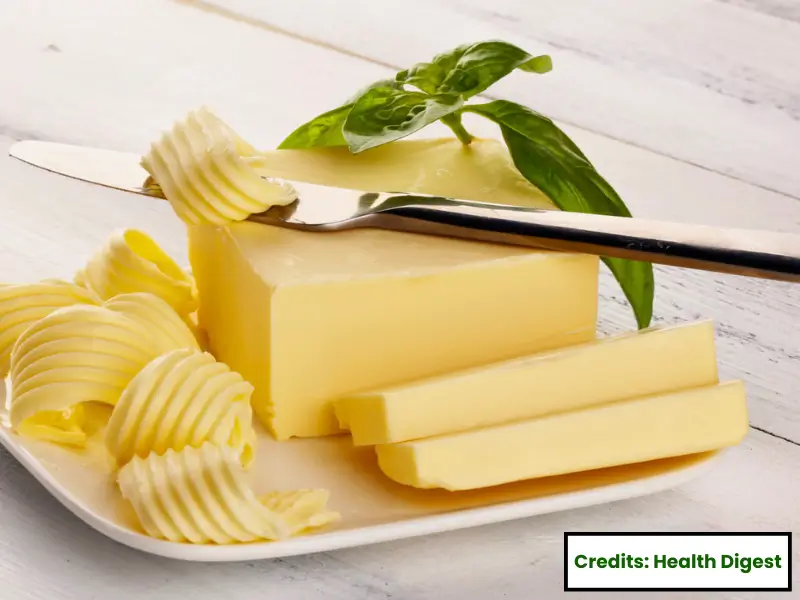
One of the best things about vegan butter is that it’s easy to find in stores or make at home. There are plenty of recipes online that guide you through the process of creating your own vegan butter with simple ingredients you probably already have in your pantry.
Since switching to a vegan diet, vegan butter has become a staple in my kitchen. It’s versatile, delicious, and a great way to enjoy the taste and texture of butter without any animal products. Vegan butter is a fantastic choice whether you’re vegan or just looking for a healthier option.
How Is Vegan Butter Made?
Traditional dairy butter is made by churning fresh cream or milk. The churning process separates the butterfat from the buttermilk, and the collected butterfat is then packed down to make dairy butter. Vegan butter, however, is made using an utterly plant-based, fascinating, straightforward process.
Choosing the Right Oil
Common oils used for vegan butter include vegetable, coconut, and sunflower oils. These oils provide a smooth texture and rich flavor. Many other plant-based oils, like olive, avocado, and almond oil, can also be used. I love using coconut oil because it adds a slight sweetness that works well in savory and sweet dishes.
Fortifying with Vitamins
The chosen oil is often fortified with vitamins A and B to ensure that vegan butter is nutritious. These vitamins are essential for maintaining good health, and strengthening the oil helps make vegan butter a healthier alternative to traditional butter.
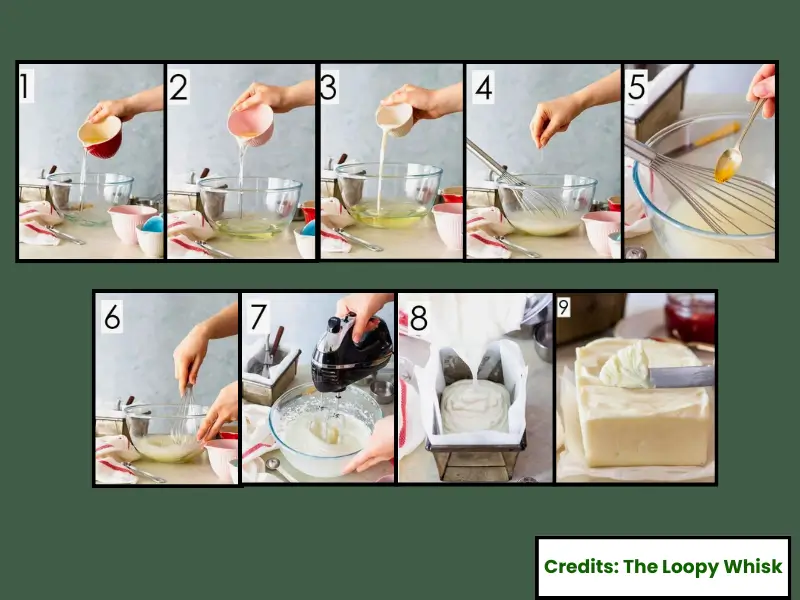
The Emulsification Process
The key to making vegan butter is emulsification. This is the process of blending the chosen oils with water or another liquid to create a smooth, uniform mixture. Emulsifiers like soy lecithin or sunflower lecithin are often added to help bind the ingredients together. The first time I made vegan butter at home, I was amazed at how quickly the oil and liquid came together into a creamy consistency.
Achieving the Right Consistency
Once the oils and emulsifiers are blended, the mixture is cooled to achieve the desired consistency. Cooling solidifies the mixture, giving it the look and feel of traditional butter. This step is crucial for ensuring that vegan butter can be used in the same way as dairy butter, whether for spreading, baking, or cooking.
What Is Vegan Butter Made Out Of?
Oil
The primary ingredient in vegan butter is oil, providing the fat content necessary for that rich, creamy texture. Common high-fat plant oils include canola, coconut, avocado, sunflower, olive, and palm oil. Each type of oil brings its own unique flavor and nutritional benefits. I love using coconut oil because it adds a subtle sweetness that enhances savory and sweet dishes.
Protein
Proteins, such as nuts, beans, or peas, are incorporated into vegan butter to achieve a creamy texture. Some brands use soy protein, either in powder form or soy milk, to achieve that smooth consistency. When I make vegan butter at home, I often use almond milk, which adds creaminess and a mild, nutty flavor that my family enjoys.
Preservatives
Natural preservatives like plant-based lactic acid and citric acid extend the shelf life of vegan butter. These also provide a slight hint of sourness, mimicking the tang of traditional dairy butter. I remember being pleasantly surprised when I noticed this subtle flavor in store-bought vegan butter—it really added to the authenticity!
Natural and Artificial Flavors
Most vegan butter contains salt to enhance the flavor and unique combinations of plant-based spices, natural flavors, and sometimes artificial flavors. Each brand has its own recipe, making the taste of vegan butter diverse and exciting. I like experimenting with different brands and even adding my own twist by mixing herbs or spices.
Coloring
Vegan butter achieves the classic yellow color of butter through the use of natural colorings like beta-carotene, turmeric, and extracts from fruits and vegetables. These give vegan butter its appealing color and add nutritional benefits. I often use turmeric in my homemade version—it gives a lovely golden hue and a slightly earthy taste.
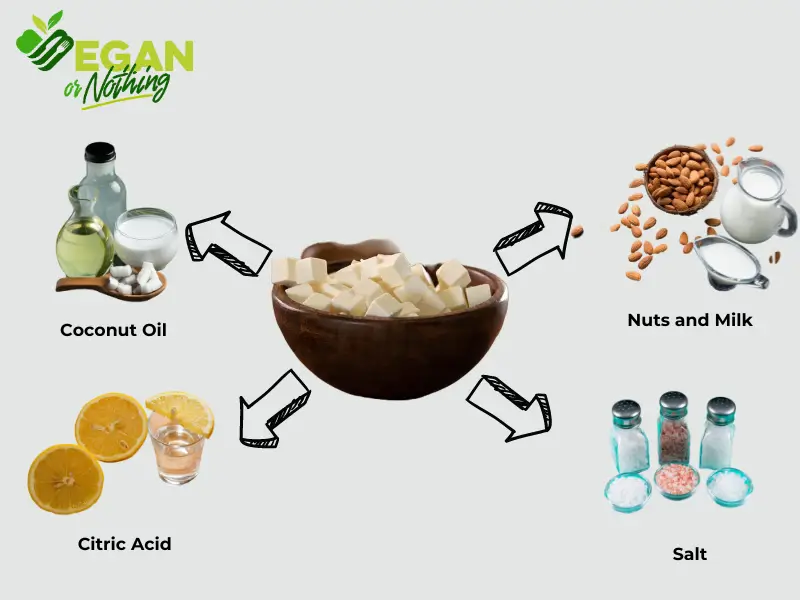
Is Vegan Butter the Same as Margarine?
Similarities
Vegan butter and margarine share many similarities in their ingredients and production methods. Both are primarily oil-based and use plant-based oils emulsified with water to achieve a smooth, spreadable texture. Common oils used in both include canola, palm, avocado, cashew, coconut, and macadamia nut. Each oil type brings its unique texture and cooking properties, allowing for versatility in different recipes. Both products also typically contain salt and plant-based solids to enhance flavor and consistency.
Main Differences
While vegan butter and margarine ingredients are similar, some key differences exist. The most crucial distinction is that vegan butter is guaranteed to be 100% plant-based and contains no animal products.
On the other hand, margarine can sometimes contain milk solids, which makes it unsuitable for those following a strict vegan diet. According to the FDA, margarine must be a plastic or liquid emulsion food containing not less than 80 percent fat. This definition allows for the inclusion of dairy in margarine, so it’s crucial to check the ingredients list if you’re avoiding animal products.
Checking Labels
When I first started my vegan journey, navigating the differences between vegan butter and margarine was a bit tricky. One helpful tip I learned is always to check the ingredients list on margarine packaging. If it doesn’t contain milk products, that particular margarine can be considered the same as vegan butter. However, for peace of mind, I usually opt for products specifically labeled as vegan butter.
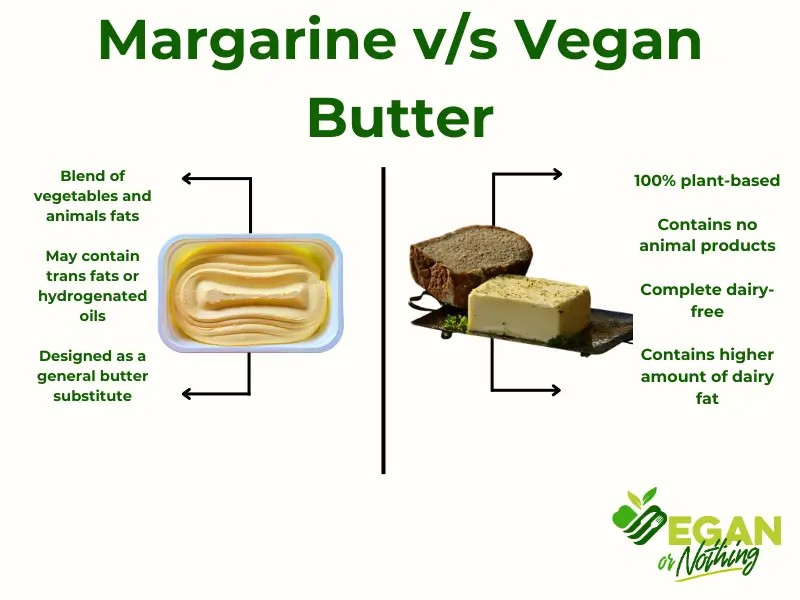
Vegan Butter Nutrition
Here’s a breakdown of the nutritional information for vegan butter per 1 tablespoon (14 grams) serving:
- Calories: 90
- Total fat: 10 grams
- Saturated fat: 6.8 grams
- Trans fat: 0 grams
- Cholesterol: 0 milligrams
- Sodium: 85 milligrams
- Total carbohydrates: 0 grams
- Protein: 0 grams
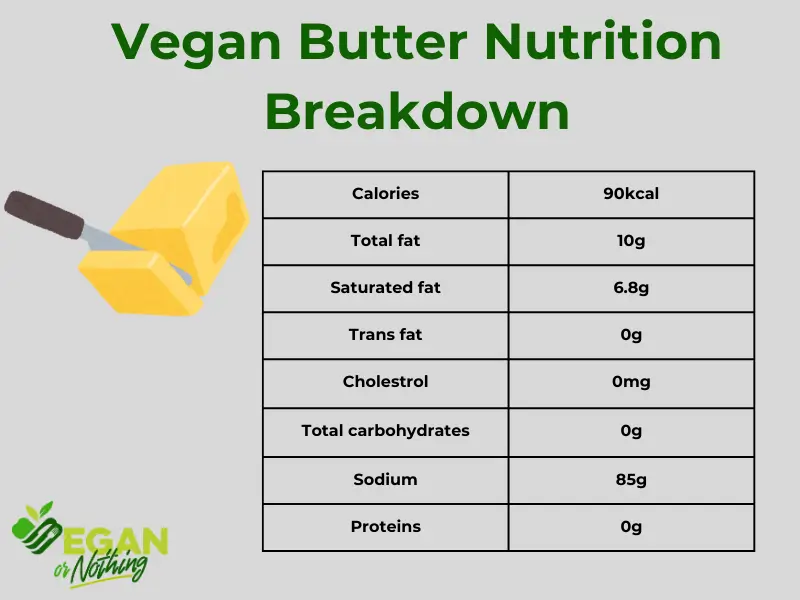
I always consider these nutritional values when using vegan butter in my recipes. It’s a great alternative that provides the creamy texture and rich taste we love without the cholesterol found in traditional butter. Whether I’m spreading it on toast or using it in baking, I feel good knowing it fits our plant-based lifestyle.
What is the Best Vegan Butter?
Finding the perfect vegan butter can transform your cooking and baking. Here are some of my favorites:
Miyoko’s offers rich, creamy butters that melt perfectly and taste amazing. They are great for spreading and baking.
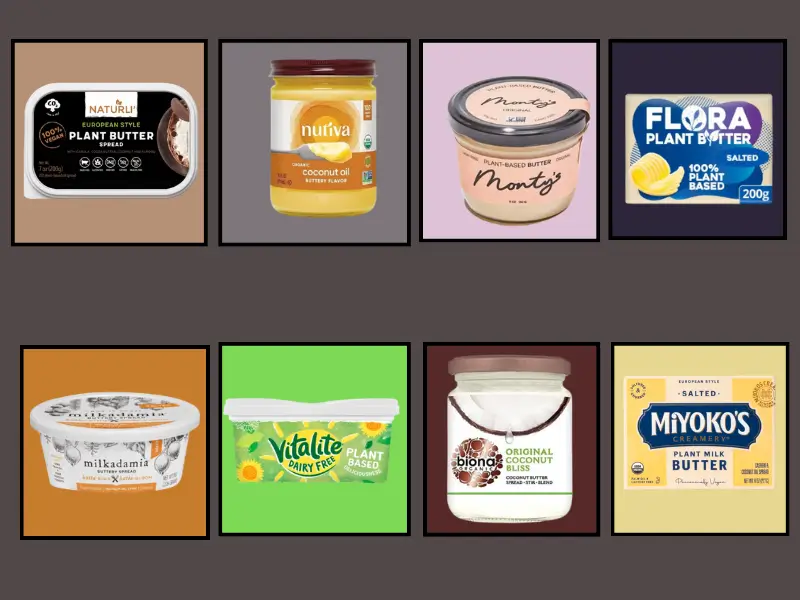
Milkadamia’s vegan butter is made from macadamia nuts, providing a unique, buttery flavor that’s wonderful on toast.
Flora’s plant-based butter is versatile and perfect for cooking and baking.
Monty’s
Monty’s butter is smooth and delicious, with a clean ingredient list I love.
Nutiva’s organic vegan butter, often coconut-based, adds a lovely, subtle flavor to dishes.
Naturali Vegan Butter
Naturali offers an outstanding balance of taste and texture, making it a go-to for many vegan recipes.
Biona’s coconut spread is ideal for those who love the tropical hint of coconut in their butter.
Vitalite
Vitalite is a reliable, everyday vegan butter that’s perfect for cooking, baking, or spreading.
Each of these vegan butter offers something unique, so I enjoy experimenting with different brands to see which ones my family loves the most. Whether you’re new to veganism or a seasoned pro, these options will satisfy your buttery cravings!
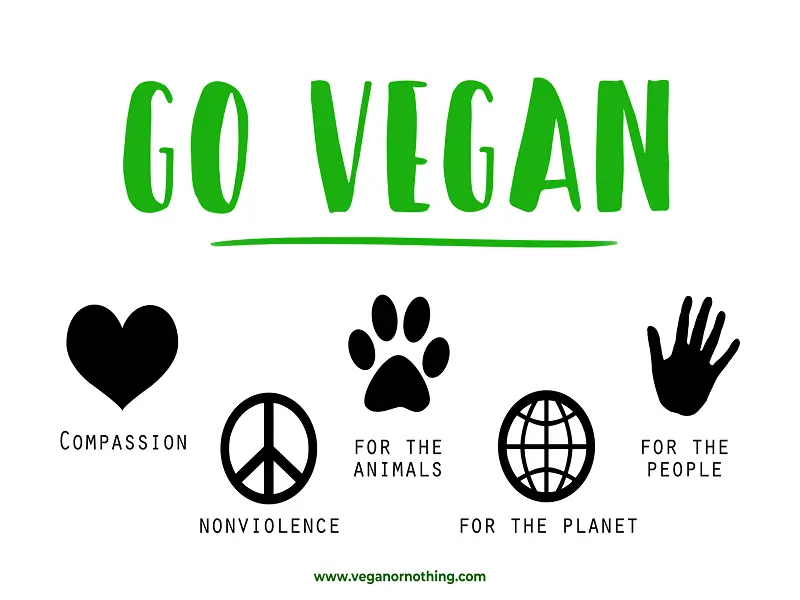
Suggested Reading:
- Finding the Best Vegan Cream Cheese: A Family’s Journey Through Eight Brands
- Vegan and Dairy-Free: How to Make Sure Your Choices Align
Conclusion
Switching to vegan butter is a healthy and sustainable alternative to traditional butter. It offers many health benefits, including cholesterol-free, a big plus for heart health.
I’ve found that vegan butter fits our plant-based lifestyle and adds delicious flavors to our meals. Vegan butter is a fantastic option whether you want to improve your health or make more eco-friendly choices. Give it a try and enjoy the benefits for yourself!
